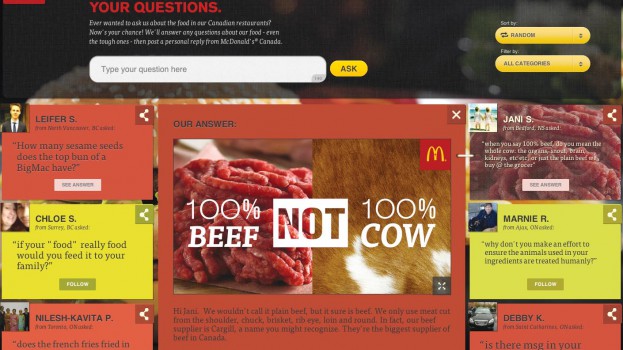McDonald’s Canada has opened itself up to internet scrutiny, inviting the Canadian public to ask any question about McD’s menu. Launched in June by Tribal DDB’s Toronto office, the “Our food. Your questions.” microsite leveraged the internet chatter by allowing McDonald’s to engage consumers and address rumours and myths around its food head-on, says Joel Yashinsky, CMO, McDonald’s Canada.
The campaign was an extension of a successful promotion it did last year, when McDonald’s invited five prominent mommy bloggers behind the counter to scrutinize the cuisine, he says.
“In today’s age, we have to build success with consumer traffic, as well as brand trust, and change some of the narrative out there,” he says. “People sometimes ask me if I eat our food. I eat it almost five days a week. We wanted people to realize [McDonald’s] is similar to the food they have in their kitchen.”
It took a huge leap of faith for the company to invite all these submissions – and not all the questions have been kind or flattering, Yashinsky says, adding that persistent myths keep popping up.
“Many customers think that we purchased a company called ‘100% Pure Beef’ and that’s how we’re able to put that on our advertising, and that’s absolutely not true,” he says. “By allowing people to ask that question, we can provide the details and hopefully change the conversation.”
This isn’t the first fast food campaign around transparency. Denver, Colorado-based Chipotle made waves early this year in the U.S. for its award-winning “Back to the Start” stop-motion commercial depicting its move towards more sustainable food processing and purchasing efforts.
Queen’s University marketing professor Ken Wong says the trend towards healthier and more transparent food processing began about two years ago as a result of record levels of type 2 diabetes and childhood obesity, with advertising finally catching up.
“I think there is a lot more scrutiny in what is in the fast food our children consume,” he says. “You’ve also got a lot of boomers getting more conscious about their health.”
He adds that the industry believes regulatory changes to fast food advertising are coming down the pipes, and as a result, companies are starting to shift their messaging and their product offerings to healthier and more sustainable options.
























